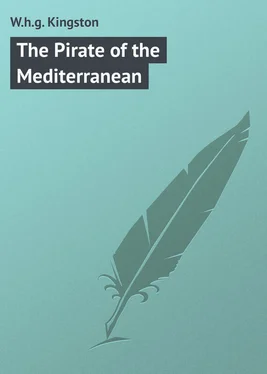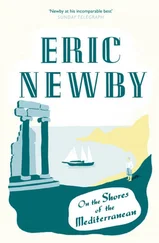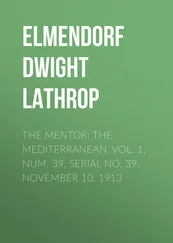W.h.g. Kingston - The Pirate of the Mediterranean
Здесь есть возможность читать онлайн «W.h.g. Kingston - The Pirate of the Mediterranean» — ознакомительный отрывок электронной книги совершенно бесплатно, а после прочтения отрывка купить полную версию. В некоторых случаях можно слушать аудио, скачать через торрент в формате fb2 и присутствует краткое содержание. Год выпуска: 0101, Жанр: foreign_antique, foreign_prose, на английском языке. Описание произведения, (предисловие) а так же отзывы посетителей доступны на портале библиотеки ЛибКат.
- Название:The Pirate of the Mediterranean
- Автор:
- Жанр:
- Год:0101
- ISBN:нет данных
- Рейтинг книги:4 / 5. Голосов: 1
-
Избранное:Добавить в избранное
- Отзывы:
-
Ваша оценка:
- 80
- 1
- 2
- 3
- 4
- 5
The Pirate of the Mediterranean: краткое содержание, описание и аннотация
Предлагаем к чтению аннотацию, описание, краткое содержание или предисловие (зависит от того, что написал сам автор книги «The Pirate of the Mediterranean»). Если вы не нашли необходимую информацию о книге — напишите в комментариях, мы постараемся отыскать её.
The Pirate of the Mediterranean — читать онлайн ознакомительный отрывок
Ниже представлен текст книги, разбитый по страницам. Система сохранения места последней прочитанной страницы, позволяет с удобством читать онлайн бесплатно книгу «The Pirate of the Mediterranean», без необходимости каждый раз заново искать на чём Вы остановились. Поставьте закладку, и сможете в любой момент перейти на страницу, на которой закончили чтение.
Интервал:
Закладка:
While he was speaking, Dunnup caught Colonel Gauntlett’s eye fixed on him, and it occurred to him that he should introduce his friend. He accordingly took him up, and introduced him in form.
“The prince is going eastward, colonel, and as you will probably meet again in the classic land of Greece, if you do not rather journey together, I feel that you should become acquainted.”
As Colonel Gauntlett rather liked the look of the stranger, he condescended to be civil to him; but as he did not speak a word of Romaic, and as his Italian was very indifferent, and his French worse, Argiri Caramitzo could scarcely understand what he said. He, however, made a polite speech full of complimentary phrases in return, and then, bowing, went back to talk to the ladies.
The handsome stranger judged that he should more speedily gain all the information he required from the niece, and might afterwards, through her, if he found it requisite, persuade the colonel to do what he desired. He found on his return that Miss Garden had been led out to dance by Captain Fleetwood, so he sat himself down to play the agreeable to Lady Marmion, and to glean from her much which he wished to know about the politics of Valetta, and which she was too happy to impart.
We, however, must follow Captain Fleetwood and Miss Garden. There was no doubt of their being lovers, by the confiding way in which she rested on his arm, and glanced up into his face as he spoke; and the look of proud happiness with which he regarded her, and seemed to defy the world to venture on the experiment of tearing her from him. Everybody observed it but Colonel Gauntlett, and he remained obstinately blind to what had taken place.
“My beloved Ada, this is the last time that I may have an opportunity of speaking to you,” said Fleetwood, as, the dance being over, he led her to an open balcony which looked out on the moonlit harbour. “You know how ardently I love you, and that willingly would I sacrifice all the prospect of your uncle’s property, if he would give his consent to our union; but I would not urge you to act in opposition to his wishes – yet there is a time when obedience ceases to be a duty, and that time must come when he obstinately refuses to give you to me.”
“He will not, he cannot do so, when he knows how dearly, how deeply you love me.” She spoke according to the dictates of her own heart; nor was she, however, wrong.
“Then this very night, or to-morrow morning, before you sail, I will ask you from him, and as soon as I pay off the Ione, which I shall probably do in the course of two months, I will come back and claim you. Shall I do so, dearest?”
“Oh, yes! do, Charles. It is the only way, and, believe me, whatever is the result, I will be faithful to you. While you claim me, I will never marry another.”
“I cannot ask more, and yet I could not demand less without contemplating an event which would wring my heart with anguish,” exclaimed Fleetwood, pressing her hand to his lips. “I think, however, we may before that time again meet – I expect to be sent to Greece, and shall contrive to visit Cephalonia.”
For some time longer the lovers talked on without taking note of its flight, when they were disagreeably interrupted by the voice of the colonel inquiring for Ada.
“Come here, miss,” he exclaimed. “Here has been Prince Caramitzo waiting for the last quarter of an hour to lead you out to dance, and you were nowhere to be found – I will not have it.” And he looked a black thundercloud at Fleetwood. “Come, Signior Principe, there is your partner ready for you.”
The prince, comprehending his meaning more by his action than his words, stepped forward, and, with a profound bow, offered his arm, which Ada, giving a glance of regret at Fleetwood, was obliged to accept. The prince was not a man, it appeared, to allow a lady to feel annoyed in his society. He first paid her a slight and delicate compliment on her beauty, which he introduced in a description of his own countrywomen and the Italians. He told her how much he admired all he had heard of England, and seen of Malta; he drew out her opinion on several subjects, and a little account of her life, and then excited her curiosity about himself.
“But how is it that, being a Greek, you speak Italian so well?” she asked.
This was just what he expected; he wished to tell her his history, but could not volunteer to do so.
“Ah, signora, it is a long story, and would fatigue you; but thus much I may tell you: – You know the misery, the abject slavery to which my beautiful, my noble country was so long subjected beneath the iron despotism of the infidel Turks. Our fathers contrived to live under it, or the present race would not have been born to avenge them. We were rapidly becoming extinct as a nation; our religion languished – our education was totally neglected. My father, however, the late Prince of Graditza, also Argiri Caramitzo, was a man superior to those around him, and determining that I, his eldest son, should have the advantage of a good education, he sent me to the famous university of Pisa, in Tuscany. I there acquired the language of Italy in its purest form; but, unhappily, I almost learned to forget my own country – I formed friendships with those among whom I lived. I not only learned to talk, but to think as an Italian, and I was even ignorant of the gallant struggle which had commenced in Greece. This was owing to the affection of my parents, who, knowing that my disposition would have prompted me instantly to throw myself wherever danger was the greatest, did not inform me of what was taking place, and when they suspected that I must have heard something on the subject, assured me that my presence would be useless, and urged me to remain where I was. Alas! I listened to their well-meant deceit, till news was brought me that my noble father had been slain in combat with the enemies of our country, and that my mother had died of grief at his loss. Then, indeed, the truth was made known to me, and, rousing myself for action, I hastened to fly to the country, where I felt that the presence of even the meanest of her brave sons was required. Alas! I found that the means of quitting Italy were wanting – I was in debt, and no funds had been transmitted to me. I contrived to exist; for my friends were kind, but innumerable delays occurred before the money I sent for arrived, and I am only now on my way to Greece – my native land, the mother of the arts and sciences, the country of Socrates and Plato, of Alexander and Aristides, the battle-fields of Thermopylae and Marathon. Ah, signora, Greece once contained all that is noble and great, and brave – what she once was, such she will be again – when we, her brave sons, have regenerated her, when we have driven forth the accursed Turk, never more to set his foot upon our sacred shore, except as a slave, and a bondman. Ah, this is the patriot’s wish – his dream by night, his hope by day. This is the bond of union which now unites the hearts of our countrymen in one great feeling – a deadly hatred of the Turk – time is coming, and will shortly arrive when Greece, brightly and freshly burnished, will come forth a model of a perfect republic to all the nations of the earth. You are happy, signora, in going to the neighbourhood, that you may watch the progress of the glorious work.”
Ada listened, and her cheek glowed with animation, for she was an enthusiast in the cause of the Greeks. She looked at the prince, and thought him a noble patriot.
The Greek intended that she should do so. He was struck by her beauty, and every instant he felt his admiration for her increasing.
A second time she accepted the prince’s hand, in preference, however, only to that of Captain Dunnup, and she became the envy of the room, for numberless fair ladies were dying to dance with the handsome prince.
Читать дальшеИнтервал:
Закладка:
Похожие книги на «The Pirate of the Mediterranean»
Представляем Вашему вниманию похожие книги на «The Pirate of the Mediterranean» списком для выбора. Мы отобрали схожую по названию и смыслу литературу в надежде предоставить читателям больше вариантов отыскать новые, интересные, ещё непрочитанные произведения.
Обсуждение, отзывы о книге «The Pirate of the Mediterranean» и просто собственные мнения читателей. Оставьте ваши комментарии, напишите, что Вы думаете о произведении, его смысле или главных героях. Укажите что конкретно понравилось, а что нет, и почему Вы так считаете.












